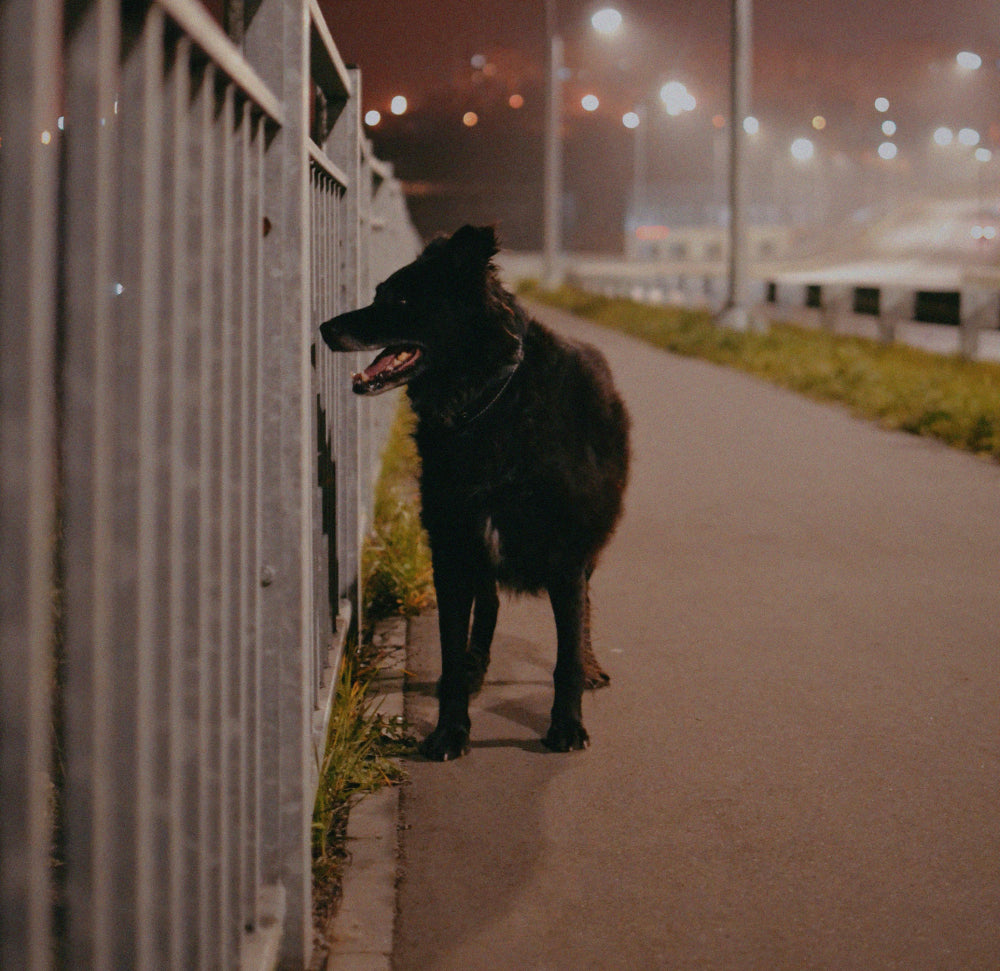Why Dogs Bark at Night: Causes and Solutions | FurLoved
The silence of the night is often broken by the sound of dogs barking, leaving many of us wondering: why do dogs bark at night?" This question resonates with pet owners and neighbors alike. Whether it's your own furry friend or the street dogs outside, understanding why dogs bark at night is essential for finding peace and fostering better relationships with our canine companions. At FurLoved, we believe in nurturing these bonds, and we're here to help you navigate this common challenge.
Understanding Why Dogs Bark at Night
Dogs bark for various reasons, and nighttime barking can be particularly puzzling. Let's delve into the common reasons why dogs bark at night and explore effective strategies to address them.
1. Communication and Alertness
Dogs are naturally vigilant creatures. At night, when the world is quieter, they become more alert to sounds that we might not even notice. This heightened awareness can explain why dogs bark at night for no reason—at least, no reason apparent to us.
They might hear distant noises, like a car door closing or a rustling in the bushes. Their acute senses make them excellent watchdogs, but this can lead to excessive barking during the night.
2. Territorial Behavior
Your dog might be barking to protect their territory. If they hear or smell something unfamiliar, they may bark to ward off perceived intruders. This territorial instinct is also a common reason why street dogs bark at night.
Dogs mark their territory not just physically but vocally. Barking serves as a warning to other animals and even humans that they are entering claimed space.
3. Boredom and Loneliness
Dogs are social animals. If left alone for extended periods, especially at night, they might bark out of boredom or loneliness. This can be a significant factor in why dogs bark at night for no reason.
Without mental and physical stimulation, dogs may resort to barking as a way to entertain themselves or seek attention.
4. Anxiety and Fear
Anxiety can cause dogs to bark excessively. Loud noises like thunder, fireworks, or even distant sirens can trigger anxiety in dogs, leading to barking at night. Changes in their environment or routine can also contribute to stress-induced barking.
5. Medical Issues
Sometimes, dogs bark at night due to discomfort or pain from underlying medical issues. Conditions like arthritis, dental problems, or urinary tract infections can cause restlessness and vocalization.
Actionable Tip: If your dog is barking more than usual, consult a veterinarian to rule out any health problems.
Why Do Street Dogs Bark at Night?
In many neighborhoods, the sound of street dogs barking at night is common. Understanding why street dogs bark at night can help communities find compassionate solutions.
1. Communication Within the Pack
Street dogs often live in packs. Barking is a way for them to communicate with each other, establish hierarchy, and coordinate activities. It's a social behavior essential for their survival.
2. Scavenging and Territory
At night, street dogs may be more active in searching for food. Barking can be a means of defending their territory from other dogs or alerting pack members to potential food sources.
3. Responding to Environmental Stimuli
Street dogs may bark at night in response to noises, lights, or human activity. They are attuned to their surroundings and may react vocally to unfamiliar or startling stimuli.
Why Do Dogs Bark at Me?
Have you ever wondered why dogs bark at me specifically? It could be due to several reasons:
- Unfamiliarity: Dogs may bark at strangers as a protective measure. If they don't recognize you, barking serves as a warning.
- Body Language: Approaching a dog too quickly or directly can be perceived as threatening. Maintaining a calm demeanor can help.
- Scent: Dogs have a keen sense of smell. Unfamiliar scents from other animals or environments can trigger barking.
Actionable Tip: When encountering an unfamiliar dog, avoid direct eye contact, move slowly, and allow the dog to approach you first.
How to Stop Dog Barking at Night
If your dog is keeping you up at night, you're likely eager to find solutions. Here's how to make a dog stop barking at night:
1. Establish a Routine
Dogs thrive on routine. Ensure your dog has a consistent schedule for feeding, exercise, and bedtime. A predictable routine can reduce anxiety and help your dog know what to expect.
2. Provide Enough Exercise
A tired dog is a quiet dog. Regular physical activity can reduce boredom and restlessness, which often leads to barking. Incorporate walks, playtime, and mental stimulation throughout the day.
3. Create a Comfortable Sleeping Environment
Make sure your dog has a cozy, quiet place to sleep. This can help reduce anxiety and encourage restful sleep. Consider the following:
- Comfortable Bedding: Provide a soft bed in a familiar location.
- Quiet Space: Choose an area away from windows and external noises.
- Soothing Sounds: Soft music or white noise can mask outside sounds that might trigger barking.
4. Address Anxiety Issues
If anxiety is causing your dog to bark at night, consider calming techniques such as:
- Calming Treats: FurLoved's calming dog treats can help reduce anxiety naturally.
- Desensitization Training: Gradually expose your dog to the stimuli that cause anxiety in controlled settings.
- Professional Help: In severe cases, consult a veterinarian or a professional dog trainer.
5. Avoid Reinforcing Barking
Do not reward your dog's barking with attention. Instead, wait until they are quiet before giving praise or treats. Consistency is key in reinforcing desired behavior.
Actionable Tip: Use positive reinforcement to reward silence. When your dog remains quiet during a situation that would typically trigger barking, acknowledge it with praise or a FurLoved treat.
How to Stop Your Dog from Barking at Family Members
If your dog is barking at family members, it may be due to excitement, anxiety, or territorial behavior.
Strategies to Address the Issue:
- Positive Reinforcement: Reward your dog when they interact calmly with family members. Encourage gentle petting and offer treats for good behavior.
- Training Commands: Teach your dog commands like "quiet" and "sit" to manage their behavior around family members.
- Consistency: Ensure all family members use the same commands and training techniques. Mixed signals can confuse your dog.
Actionable Tip: Involve all family members in training sessions to build trust and understanding between your dog and each person.
How to Stop a Dog Barking at Strangers
Dogs may bark at strangers due to fear or protective instincts. Here's how to address this behavior:
1. Socialization
Gradually expose your dog to different people and environments. Positive experiences with strangers can reduce fear and anxiety.
2. Controlled Introductions
Allow your dog to meet strangers in a controlled setting. Ask visitors to offer treats and speak softly, helping your dog associate strangers with positive experiences.
3. Professional Training
A dog trainer can help address aggressive or fearful behaviors. They can provide customized strategies based on your dog's specific needs.
Actionable Tip: Use FurLoved treats as rewards during socialization to reinforce positive interactions with strangers.
How to Make Neighbor's Dog Stop Barking
Dealing with a neighbor's barking dog can be challenging. Here are steps you can take:
1. Communicate Politely
Approach your neighbor calmly to discuss the issue. They may not be aware of the problem.
2. Offer Solutions
Suggest ways to help, such as sharing information on training techniques or recommending a professional trainer.
3. Use Noise-Cancelling Methods
For temporary relief, consider using earplugs or a white noise machine to mask the barking.
4. Contact Authorities
As a last resort, check local noise ordinances or speak to animal control if the problem persists and the neighbor is uncooperative.
Why Do Dogs Cry at Night?
Crying or whining at night can be due to similar reasons as barking:
1. Separation Anxiety
Dogs may cry when left alone, especially if they are accustomed to constant companionship.
2. Discomfort
Hunger, thirst, or needing to relieve themselves can cause crying. Ensure your dog's needs are met before bedtime.
3. Attention-Seeking
Dogs may cry to get your attention. If they've learned that crying results in a response, they may continue the behavior.
Actionable Tip: Establish a bedtime routine that includes a final bathroom break, a comfortable sleeping area, and a brief period of calm interaction.
Why Do Street Dogs Cry at Night
Street dogs may cry at night due to:
1. Injury or Illness
Without care, street dogs may suffer from untreated ailments causing pain and distress.
2. Hunger and Thirst
Lack of access to food and clean water can lead to crying and whining.
3. Social Interaction
Crying can be a form of communication among dogs, especially when separated from their pack.
Community Action: Supporting local animal welfare organizations can help address these issues by providing food, medical care, and shelter for street dogs.
Why Do Dogs Howl at Night
Howling is another form of canine vocalization. Here's why dogs may howl at night:
1. Ancestral Traits
Dogs may howl as a remnant of wolf behavior. It's a natural instinct that connects them to their wild ancestors.
2. Communication
Howling can signal their presence to other dogs, marking territory or calling out to members of their pack.
3. Response to Sounds
Sirens, musical instruments, or other high-pitched noises may trigger howling as dogs mimic the sounds they hear.
Actionable Tip: If your dog's howling becomes problematic, distract them with a toy or engage them in a quiet activity.
Street Dog Sounds and Their Meanings
Street dogs produce various sounds, including barking, crying, and howling, each serving different purposes.
1. Barking
- Alerting Others: Warning of potential threats or intruders.
- Defending Territory: Establishing dominance over an area.
2. Crying
- Expressing Distress: Indicating pain, hunger, or fear.
- Seeking Attention: Communicating needs to other dogs or humans.
3. Howling
- Long-Distance Communication: Connecting with other dogs over distances.
- Response to Environment: Reacting to sounds or signaling presence.
Understanding these sounds can foster empathy and guide community efforts to support street dogs humanely.
How to Calm a Barking Dog
Calming a barking dog involves addressing their needs and modifying their behavior.
Strategies to Calm Your Dog:
- Identify Triggers: Observe what causes the barking and work to minimize exposure.
- Use Calming Aids: Products like FurLoved's treats can help reduce anxiety.
- Provide Mental Stimulation: Interactive toys and puzzles can keep your dog engaged and reduce boredom.
- Practice Patience: Consistency and positive reinforcement are key. Avoid yelling or punishment, as it can increase anxiety.
FurLoved: Helping You and Your Dog Enjoy Peaceful Nights
At FurLoved, we understand the challenges of nighttime barking. Our range of dog treats is designed not only to delight your pet but also to aid in training and behavior management.
Why Choose FurLoved Dog Treats?
- Natural Ingredients: Made with wholesome, high-quality ingredients that are safe and nutritious.
- Perfect for Training: Use our treats to reward quiet behavior and reinforce training commands.
- Calming Properties: Some of our treats include ingredients like chamomile and valerian root, known for their calming effects.
How FurLoved Treats Can Help
By incorporating FurLoved treats into your training routine, you can encourage positive behavior and reduce unwanted barking.
- Reward Silence: Give a treat when your dog is quiet after barking, reinforcing the desired behavior.
- Distract from Triggers: Use treats to redirect your dog's attention from stimuli that cause barking.
- Strengthen Bonds: Positive interactions with treats can improve your relationship with your dog, fostering trust and security.
Actionable Tip: Keep a supply of FurLoved treats handy during walks or when guests visit to manage your dog's reactions effectively.
Community Efforts to Address Street Dog Barking
Addressing the issue of street dogs barking at night requires compassionate community involvement.
1. Support Animal Welfare Organizations
These organizations work to provide medical care, food, and shelter for street dogs, improving their well-being and reducing distress-related barking.
2. Spay and Neuter Programs
Controlling the street dog population through spaying and neutering can reduce territorial behaviors and vocalizations.
3. Education and Awareness
Promoting understanding of dog behavior helps communities coexist peacefully with street dogs.
Conclusion
Understanding why dogs bark at night is the first step toward addressing the issue. Whether it's your own dog or street dogs in your area, recognizing the reasons behind the barking can lead to effective solutions. By implementing training techniques, addressing your dog's needs, and using tools like FurLoved's natural dog treats, you can enjoy quieter nights and a happier pet.
At FurLoved, we're committed to helping you and your dog live harmoniously. Our products are crafted with care, prioritizing quality and natural ingredients. Explore our range of dog treats and discover how they can make a difference in your dog's behavior.
Ready to make a change? Visit our website or contact us to find the perfect treats for your furry friend.











